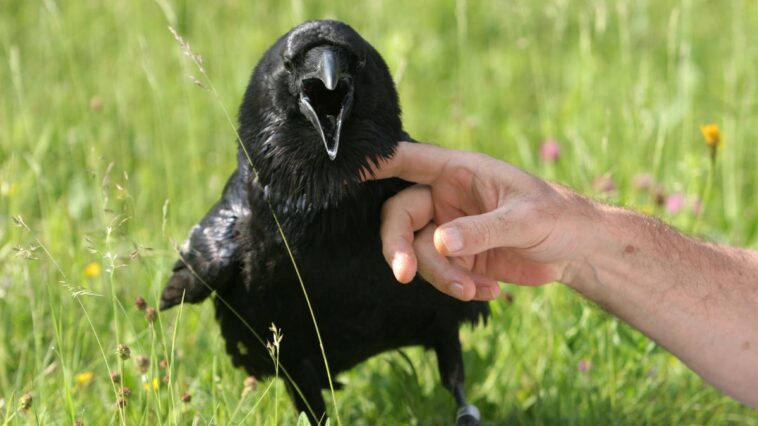Are you considering owning a pet raven? As unique and intriguing as these birds are, there are a few things you need to know before making them a part of your household. Ravens are highly intelligent, social creatures that require a lot of attention and specialized care. They can live for up to 30 years, so preparing for a long-term commitment is important. Additionally, owning a raven may not be legal in all areas and requires specific permits.
In this article, we’ll explore everything you need to know about keeping a pet raven, from their behavior and dietary needs to legal considerations and potential challenges. By understanding what it takes to care for a raven, you can determine if owning one is the right choice for you and your lifestyle. So, let’s dive into the fascinating world of raven pets!
Understanding the Raven species
Ravens belong to the Corvid family, including crows, magpies, and jays. They are found throughout the Northern Hemisphere and are known for their distinctive black feathers and large size. Ravens are highly intelligent and have been observed using tools, solving puzzles, and playing games. They are highly social and often form lifelong friendships with their mates and family.
In the wild, ravens are omnivores, feeding on various foods, including insects, small mammals, and carrion. They are opportunistic feeders and will scavenge for food whenever possible. Ravens are also known for their vocalizations, which include a variety of caws, croaks, and other sounds. They use these calls to communicate with other ravens and to defend their territory.
Are Raven Pets Legal?
Before considering a raven pet, it’s important to check the legal requirements in your area. In many places, owning a raven without a permit is illegal. Ravens are considered wildlife and are protected under federal and state laws. In some cases, permits may be available for individuals who demonstrate they have the proper experience and facilities to care for a raven. However, obtaining a permit can be a lengthy and challenging process.
It’s also important to note that even if owning a raven is legal in your area, it may not be the best choice for everyone. Ravens require a lot of attention and specialized care, and they may not be suitable for households with young children or pets. They can also be noisy and messy, which may not be ideal for those living in apartments or close quarters.
Pros and Cons of Having a Raven Pet
Having a raven as a pet can be a fascinating and unique experience, but it has pros and cons. Here are some pros and cons to consider before deciding to have a raven as a pet:
Pros:
- Intelligence: Ravens are highly intelligent birds and possess problem-solving abilities. They can learn to mimic sounds, solve puzzles, and even perform tricks with proper training.
- Bonding and companionship: Ravens are known to form strong bonds with their human caretakers. They can be affectionate and enjoy social interaction, leading to rewarding companionship.
- Fascinating behavior: Ravens have complex and interesting behaviors. They are known for their playful nature, curiosity, and ability to exhibit various vocalizations. Observing their behavior can be a source of constant amusement and learning.
- Long lifespan: Ravens have a relatively long lifespan compared to many other pets. In the wild, they can live up to 20 years or more. They can live even longer in captivity with proper care and nutrition.
- Unique pet experience: Owning a raven sets you apart from conventional pet owners. It offers a unique opportunity to connect with a highly intelligent and captivating creature, creating an extraordinary pet experience.
Cons:
- Legal restrictions: Before considering a raven as a pet, it’s essential to research and understand the legal restrictions in your area. In many places, owning a raven or any other wild bird species as a pet may be illegal without the necessary permits.
- Specialized care requirements: Ravens have specific care needs that may be more challenging than common pet species. They require large, secure aviaries or outdoor enclosures for flying and exploring. Their diet should include diverse foods, including fruits, vegetables, meats, and insects.
- Noise level: Ravens are vocal birds and can be quite loud, especially during their natural vocalizations or when seeking attention. This may be unsuitable for individuals sensitive to noise or living in apartments or close quarters.
- Mess and maintenance: Ravens can be messy pets. They can scatter food, feathers, and droppings, requiring regular enclosure cleaning. Additionally, they may engage in destructive behavior if they do not have sufficient mental and physical stimulation.
- Long-term commitment: Ravens have a long lifespan, meaning owning one requires a significant long-term commitment. You must be prepared to care for a bird that may live for several decades.
- Limited domestication: Unlike some domesticated pet species, ravens retain their wild instincts and behaviors to a significant extent. This means that despite training and socialization, they may exhibit a different level of predictability or adaptability than more domesticated animals.
Before deciding to have a raven as a pet, it’s crucial to thoroughly research their care requirements, legal considerations, and the commitment involved. It’s also advisable to consult with avian experts or experienced raven owners to gain more insights into the reality of having a raven as a pet.
Preparing for a Raven pet – Housing and Feeding
If you’ve decided that a raven pet is right for you, preparing for their housing and feeding needs is essential. Ravens require a large, secure enclosure with plenty of space to fly and exercise. The enclosure should be sturdy to prevent escape and keep predators out. It should also include perches, toys, and other items to stimulate and enrich.
Regarding diet, ravens require a varied diet that includes a mix of protein, fruits, and vegetables. They feed on various foods in the wild, including insects, small mammals, and carrion. In captivity, they can be fed a diet of high-quality dog food, cooked meat, fruits, and vegetables. It’s important to avoid feeding them processed foods or foods high in fat or sugar.
Raven Pet Training Tips
Training a raven can be a unique and rewarding experience. While they are highly intelligent birds, their training requires patience, consistency, and understanding of their natural behaviors. Here are some tips to help you with raven pet training:
- Bond with your raven: Spend time regularly to build trust and create a strong bond. Offer treats, engage in interactive play, and speak to them softly. Ravens are social birds and enjoy human interaction.
- Positive reinforcement: Use positive reinforcement techniques to reward desired behaviors. Ravens are motivated by food rewards, so they use their favorite treats, like small pieces of meat, fruits, or nuts, to reinforce good behavior. Be consistent and reward them immediately after they perform the desired action.
- Basic obedience commands: Start with basic obedience commands such as “come,” “stay,” and “perch.” Use a calm and assertive voice when giving commands, and reward your raven when they respond correctly. Break down complex behaviors into smaller steps to make it easier for them to understand.
- Clicker training: Consider using a clicker to train your raven. Clicker training involves using a clicker as a marker to indicate when your raven has performed the desired behavior correctly. Pair the clicker sound with a reward to reinforce positive associations. Clicker training can be especially useful for teaching more complex tricks or behaviors.
- Enrichment and mental stimulation: Ravens are highly intelligent birds that require mental stimulation to prevent boredom and promote their well-being. Provide them with puzzle toys, interactive toys, and foraging opportunities to keep them mentally engaged. Rotate and introduce new toys regularly to keep them interested.
- Respect their independence: While ravens can be trained, they also have a strong sense of independence. It’s important to respect their instincts and behaviors. Avoid forcing them into uncomfortable situations and give them space when needed.
- Consistency and patience: Training a raven takes time and patience. Be consistent with your training sessions, and keep them short and frequent for better results. Ravens are known for their problem-solving abilities, so be prepared for their inquisitive nature and adjust your training approach accordingly.
- Avoid punishment: Avoid using punishment-based training methods with your raven. Ravens respond better to positive reinforcement and building a trusting relationship. Punishment can lead to fear or aggression and can hinder the training process.
- Socialize your raven: Introduce them to different people, environments, and experiences to help them socialize well. This will make them more adaptable and confident in different situations.
- Seek professional guidance: If you’re new to raven training or facing specific challenges, consider seeking professional help from an experienced bird trainer or an avian behaviorist. They can provide personalized advice and guidance based on your raven’s needs.
Training a raven requires time, commitment, and a deep understanding of its behavior. Enjoy working with your raven and appreciate their unique intelligence and abilities.
Common Health Issues and How to Prevent Them
Like any pet, ravens can experience various health issues, including respiratory infections, feather plucking, and obesity. To keep your raven healthy, providing them with a balanced diet, regular exercise, and regular veterinary care is essential. This includes regular check-ups, vaccinations, and parasite prevention.
Another important aspect of raven’s health is their mental well-being. Ravens are highly social creatures and require regular socialization and stimulation. Without enough social interaction and enrichment, they can become anxious, depressed, and even aggressive. To prevent these issues, provide your raven with plenty of toys, perches, and other items to keep them engaged and stimulated.
Handling and Socializing with a Raven Pet
Ravens are highly social creatures and require regular socialization and interaction with their owners. They can be trained to perch on your shoulder or hand and even learn to play games like fetch. However, it’s important to remember that ravens are not domesticated animals and should be treated respectfully and cautiously.
When handling a raven, it’s important to establish trust and respect through positive reinforcement techniques. Avoid grabbing or restraining your raven, as this can damage your relationship with them. Instead, use treats and praise to encourage them to approach you and perch on your hand or shoulder. Always be gentle and patient, and never force your raven to do something they are uncomfortable with.
Where to Find a Raven Pet
Finding a reputable breeder or rescue organization is important if you’ve decided that a raven pet is right for you. Ravens are not commonly bred in captivity, so finding a breeder may be difficult. However, a few reputable organizations specialize in rescuing and rehabilitating ravens injured or abandoned.
Before bringing a raven home, it’s important to research the organization and ensure they follow proper animal welfare guidelines. Also, ensure you have the necessary permits and legal requirements before bringing your raven home.
Conclusion: Is a Raven Pet Right For You?
Owning a raven can be a rewarding and fascinating experience, but it’s not for everyone. Ravens require a lot of attention and specialized care, and they may not be suitable for households with young children or other pets. They can also be noisy and messy, which may not be ideal for those living in close quarters.
If you’re considering a raven pet, it’s essential to research and understand what it takes to care for them properly. This includes understanding their behavior, dietary needs, legal requirements, and potential challenges. By educating yourself, you can determine whether a raven pet is right for you and your lifestyle.




